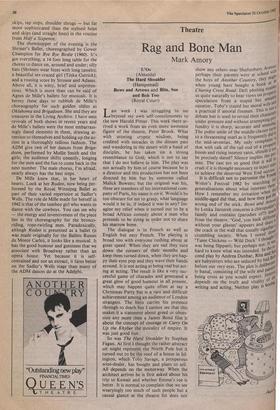Theatre
Rag and Bone Man
Mark Amory
L' Os (Almeida) The Hard Shoulder (Hampstead) Bows and Arrows and Rita, Sue and Bob Too (Royal Court) Last week I was struggling to see beyond my own self-consciousness to the new Harold Pinter. This week there ar- rived a work from an even more awesome figure of the theatre, Peter Brook. What with uttering cryptic wisdom, being credited with miracles in the distant past and wandering in the desert with a band of disciples, he has taken on a strong resemblance to God; which is not to say that I do not believe in him. The play was not actually by him of course because he is a director and this production has not been directed by him but by someone called Malick Bowens; but the original was his, these are members of his international com- pany of Paris, his name is on it. Would it be too obscure for me to grasp, what language would it be in, if indeed it was in any? Im- agine my relief when it turned out to be a broad African comedy about a man who pretends to be dying in order not to share his marrow bone.
The dialogue is in French as well as English but easy French. The playing is broad too with everyone rushing about at great speed. When they are sad they turn down the corners of their mouths and keep them turned down, when they are hap- py their eyes pop and they wave their hands around. It is not acting at being real but act- ing at acting. The result is like a very suc- cessful game of charades and generated a great glow of good humour in all present, which may happen quite often at say a Christmas Party but is a rare and difficult achievement among an audience of London strangers. The hero carries his pretence through to death but I cannot see that this makes it a statement about greed or obses- sion any more than a James Bond film is about the concept of courage or Carry On Up the Khyber the morality of empire. It was just good fun.
So was The Hard Shoulder by Stephen Fagan. At first I thought the rather abstract set might represent the North Pole but it turned out to be the roof of a house in Isl- ington, which Toby Savage, a prosperous wine-dealer, has bought and plans to sell. All depends on the motorway. When the architect arrives he is first asked about his trip to Kuwait and whether Emma's toe is better. It is normal to complain that we see wearyingly too much of such people but a casual glance at the theatre list does not
show any others near Shaftesbury Averiu.e,' perhaps their parents were at school WIL'i the boys of Another Country, they rillgoll, when young have bought a book at 0" Charing Cross Road. Deft plotting enables us quite naturally to hear views on proper[! speculation from a stupid but amiab; squatter, Toby's stupid but moral wife an, a practical if amoral fireman. This is not debate but is used to reveal their characters under pressure and without attempting P.* fundity it is sharp, accurate and amusing; The polite smile of the middle-classes tarn0 to a threatening snarl as it frequently did lis the mid-seventies. My only complaint ,,, that with talk of the tail end of a proper'', boom and rising interest rates, should Ito!' be precisely dated? Silence implies the Prbre sent. The cast are so good that it ill cruel if it is thought necessary to inject stars to achieve the deserved West End succet i It is difficult not to patronise the Y° I; i Writer's Festival 1982 by searching ' i generalisations about what interests theilite (;
th
How I remember my irritation when the middle-aged did that, and how they g ..,5 wrong end of the stick. Bows and Arro.",s by Lenka Janiurek concerns a chiropo family and contains (parodies of?)rritj„i from the theatre. 'God, you look cliffere's without your glasses' appears and there a the crack in the wall that usually signirl, crumbling society. When I noted 0°',1 `Tame Chickens — Wild Duck' 1 though` was being flippant; but perhaps not. it hard to know what was intended. In the sii't cond play by Andrea Dunbar, Rita and Sob are babysitters who are seduced by bad130, before our very eyes. The plot is delibera t, ly banal, consisting of the wife and Parentbeing cross as you would expect. Inteerthe
depends on the truth and vitality writing and acting. Neither play is b°11










































 Previous page
Previous page